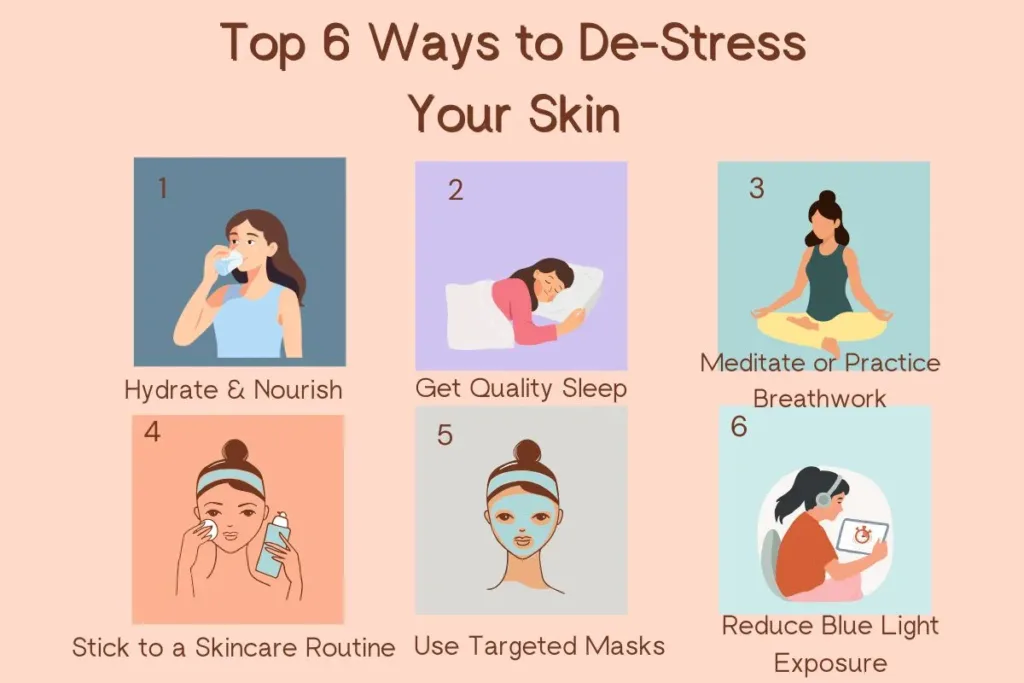No products in the cart.

Ever looked in the mirror after a stressful week and felt like your skin was shouting louder than your thoughts? You’re not alone. Stress is more than a mental burden—it leaves visible signs on your skin, turning once-radiant complexions into canvases of face stress lines, dullness, and breakouts. If you’ve ever wondered, what does stress do to your face, the short answer is: more than you think. Stress doesn’t just affect your mood; it can age your face, trigger skin conditions, and accelerate skin disorders linked to internal inflammation.
But here’s the secret that most people don’t talk about: stress shows up differently on everyone’s skin—and it’s often mistaken for something else. What if your “acne” or “eczema” isn’t just a product of poor diet or hormones, but actually a physical manifestation of stress? Let’s unpack how you can decode those signs, calm your anxious face, and take back control—because stressed face doesn’t have to be your story.
Understanding the Link Between Stress and Skin
What Does Stress Do to Your Face?
Stress triggers the release of cortisol, your body’s primary stress hormone. While this hormone is vital for survival, chronic overproduction due to daily stress can lead to a cascade of skin issues. High cortisol disrupts the skin’s natural barrier, leading to increased sensitivity, inflammation, oiliness, and ultimately: stress breakout on face.
It can also deplete collagen and elastin—those powerful proteins that keep your skin firm and youthful. The result? Stress wrinkles, face stress lines, and that unmistakable stressed-out face you just can’t seem to scrub away. Over time, this chronic tension can even cause skin conditions stress related such as eczema, psoriasis, and rosacea.
Common Signs of a Stressed Face
- Fine Lines and Wrinkles Deepen: One of the first and most noticeable signs of chronic stress is the deepening of fine lines and face stress lines around the forehead, eyes, and mouth. Elevated cortisol levels speed up collagen and elastin breakdown, making skin lose its elasticity and firmness.
- Tired, Dull, or Uneven Complexion: Stress impairs the skin’s ability to retain moisture and defend against external aggressors, resulting in a lackluster tone. This disruption can make skin appear lifeless, dry, or uneven in texture and color.
- Persistent ‘Anxious Face’ Expression: Chronic stress can lead to involuntary facial tension. You might notice a stressed-out face marked by tightened jaw muscles, furrowed brows, and hollow under-eyes—subtle but powerful indicators of internal strain.
- Under-Eye Puffiness and Fatigue: Sleep disturbances related to stress often cause fluid retention, leading to puffiness under the eyes. The lack of quality sleep also reduces nighttime cellular repair, compounding signs of fatigue.
- Inflammatory Skin Conditions: Stress activates inflammatory pathways that can lead to skin disorders from stress, such as eczema, psoriasis, rosacea, or hives. These conditions are often misdiagnosed as allergic reactions but can be triggered or worsened by emotional distress.
- Increased Acne and Breakouts: Hormonal changes caused by stress, particularly elevated androgens, increase oil production in the skin. This leads to clogged pores, blackheads, and full-blown stress breakout on face, especially on the jawline and cheeks.
- Dehydrated and Sensitive Skin: Chronic stress breaks down your skin’s natural barrier, leading to moisture loss, flakiness, and increased sensitivity. This makes your skin more reactive to skincare products and environmental elements.
- Rapid Aging Appearance: Wondering can stress change your face? Yes—ongoing stress accelerates visible aging, including stress wrinkles, loss of skin volume, and sagging facial contours, often within a short period of time.
Why You Might Be Experiencing Skin Disorders from Stress
When under emotional pressure, your immune system weakens, your sleep quality suffers, and your skincare routine usually goes out the window. That’s a perfect storm for stress skin disease. Prolonged stress disrupts the skin’s natural equilibrium, increasing sensitivity and impairing its ability to repair itself. The body enters a state of chronic inflammation, which not only worsens existing conditions like acne, eczema, or rosacea but also makes your skin more susceptible to infections and allergic reactions.
Stress can also trigger an overproduction of sebum due to heightened cortisol levels, leading to oily skin and clogged pores. Simultaneously, blood circulation to the skin is reduced, depriving it of essential oxygen and nutrients. This contributes to a dull complexion and delays healing from breakouts or irritations. Add to that environmental pollutants and lifestyle shifts—like sugar cravings and dehydration—and you’ve got the ideal environment for persistent flare-ups, redness, and sensitivity.
Moreover, disrupted sleep caused by stress affects the skin’s nighttime regeneration process. Without proper rest, your skin loses its chance to detox and repair, which accelerates signs of aging and weakens its barrier against everyday aggressors. These combined factors explain why many people notice visible skin changes during stressful periods and experience flare-ups of skin conditions stress related.
How Does Skincare Reduce Stress?
The skin has its own microbiome and nervous system connections—what you apply externally can have internal effects. A consistent skincare routine works like mindfulness: it signals your brain to slow down. Self-care rituals like facial masking can not only improve your skin but also regulate cortisol levels. Think of it as your daily pause button.
Engaging in a skincare ritual, even for a few minutes each day, offers a meditative moment of self-connection and sensory grounding. The textures, scents, and touch involved in skincare activate the parasympathetic nervous system, also known as the body’s “rest and digest” mode. This reduces stress-induced inflammation and helps the body shift away from a heightened state of alertness.
Topical products can also influence mood. For example, botanicals like lavender and citrus not only benefit the skin but offer calming or energizing effects through their natural aromatherapeutic properties. This combination of tactile care and sensory stimulation makes skincare a holistic experience, supporting emotional well-being while enhancing your physical appearance.
When skincare is performed regularly, it cultivates a sense of control and predictability—something especially valuable during stressful times. Over time, this small but powerful habit can help reduce the visible signs of stress in face and support both mental clarity and skin resilience.
Hudira’s Answer to Stress-Affected Skin
At Hudira, we believe skincare should soothe not just your face, but your soul. Our products are clean, halal, and consciously formulated to target stressed face panels with nature’s finest ingredients.
Anti-Acne Face Mask
This mask is your skin’s best friend during those high-stress weeks. Packed with natural antibacterials and inflammation-fighters, it helps calm stress breakout on face and restore the skin’s natural balance. Use it during flare-ups or as weekly maintenance for radiant, resilient skin.
Orange Glow Face Mask
Infused with vitamin C-rich botanicals, this mask is designed to tackle stress wrinkles and dullness. The uplifting citrus scent and glow-boosting ingredients help turn your stressed face into a beaming one. It’s more than skincare—it’s aromatherapy and glow therapy in one.
Top 6 Ways to De-Stress Your Skin (and Your Mind)

Hydrate & Nourish:
Drinking enough water throughout the day helps flush toxins from your system and maintain your skin’s elasticity and glow. Hydration supports cellular turnover, which is vital for restoring skin affected by stress. Complement this by eating foods rich in antioxidants—like berries, leafy greens, and nuts—which fight free radicals and inflammation.
Get Quality Sleep:
Your skin regenerates and repairs itself while you sleep. Chronic sleep deprivation increases cortisol levels, leading to more pronounced stress in face features like dark circles, puffiness, and dryness. Aim for 7–9 hours of restorative sleep each night and maintain a calming bedtime routine to support your circadian rhythm.
Meditate or Practice Breathwork:
Stress reduction techniques like mindfulness meditation, deep breathing, and yoga help regulate your nervous system and decrease cortisol. These practices release muscle tension in your jaw, forehead, and neck—areas often showing an anxious face—and improve oxygenation to the skin for a healthier complexion.
Stick to a Skincare Routine:
Consistency is key to supporting your skin’s protective barrier. A daily regimen of gentle cleansing, hydrating toner, nourishing serum, moisturizing, and SPF forms a defense against external stressors. Taking just 10 minutes daily to nurture your skin helps restore emotional balance and reinforces self-worth.
Use Targeted Masks (Like Hudira’s):
Hudira’s Anti-Acne and Orange Glow face masks are ideal for addressing face stress lines and skin conditions stress related. These masks provide a moment of pause, while powerful botanical ingredients work to calm inflammation, brighten dull skin, and restore moisture—turning stress relief into a luxurious self-care ritual.
Reduce Blue Light Exposure:
Prolonged exposure to screens can disrupt sleep and accelerate face stress lines. Blue light stimulates wakefulness, which interferes with melatonin production and contributes to poor skin regeneration. Limit screen time before bed and consider using blue light filters to protect both your skin and your sleep quality.
When to See a Dermatologist
If your symptoms of stress skin disease persist despite a consistent routine, consult a skin professional. Chronic skin disorders from stress may require prescription treatments or medical diagnostics.
Your Skin, Rewritten
You deserve more than temporary fixes. You deserve rituals that renew—not just your skin—but your spirit. At Hudira, we make products that are more than cosmetic. They are self-care essentials designed to de-stress your face, your routine, and your life.
Take the first step today. Your skin is waiting for you.
Call to Action
Reclaim your calm, glow with grace. Shop Hudira’s Anti-Acne and Orange Glow face masks now to reveal your most radiant, stress-free skin.
FAQs
Q. Can stress cause skin problems like acne and eczema?
Yes, stress alters hormone levels and immune responses, causing breakouts, rashes, and worsening of existing conditions.
Q. What does stress do to your face in the long run?
Chronic stress accelerates aging, promotes stress wrinkles, and can even change facial structure over time.
Q. Are Hudira face masks suitable for sensitive skin?
Absolutely! Our products are formulated with gentle, natural ingredients that nourish stressed face.
Q. How does skincare reduce stress?
Regular rituals can lower cortisol, induce calm, and improve skin barrier function—supporting mind-body balance.
Q. Can stress cause long-term skin disease?
Yes. Prolonged stress can lead to chronic inflammation and persistent skin conditions like rosacea or dermatitis.



Add comment